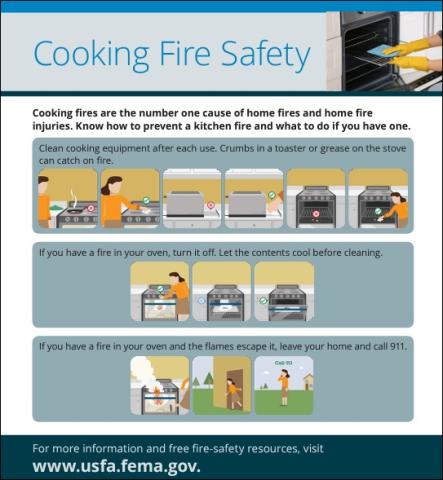Public Safety for Kansans
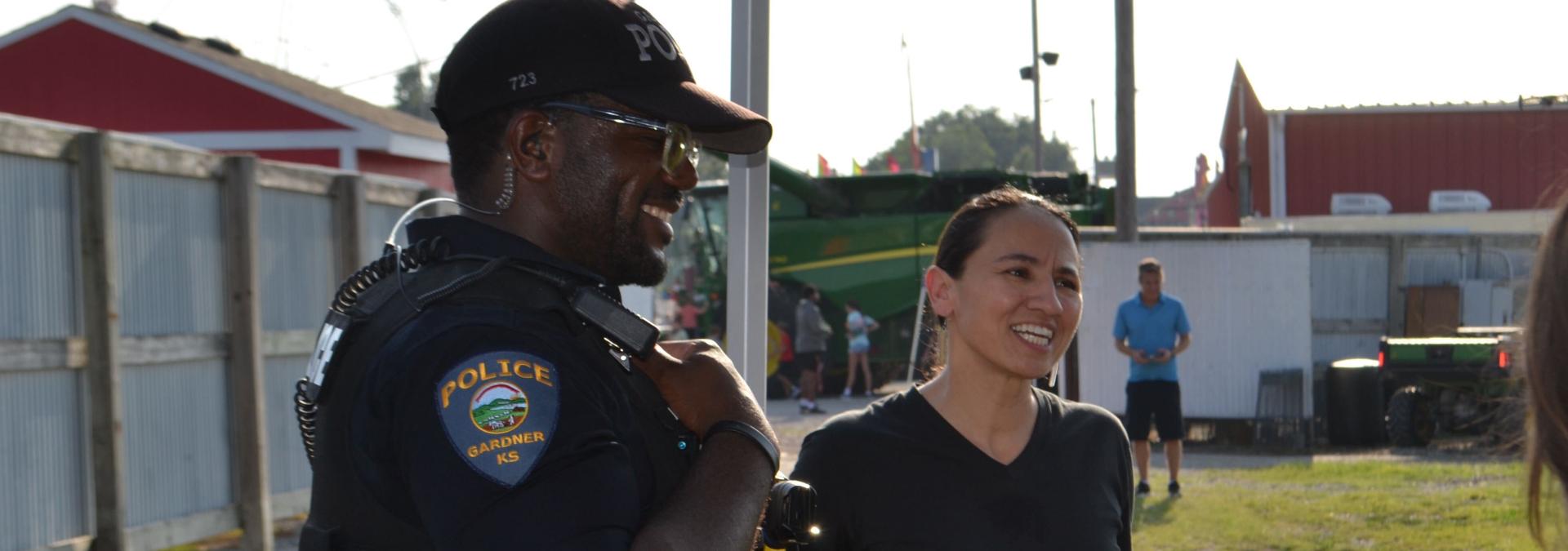
No one should fear walking home at night or dropping their kids off at school. I've made it a priority to ensure Kansas is always a safe place to live, work, and raise a family.
This begins by partnering with local police departments. My mom is an Army veteran and served in law enforcement for a time herself. I know police officers have difficult jobs. That's why my focus is on concrete and bipartisan solutions to protect Kansans.
- I've helped secure more than $27 million in federal public safety grants to hire more local police officers, prevent crime, and get criminals off our streets. That includes support for police departments in Overland Park, Gardner, and more.
- I've also voted for bipartisan laws to crack down on cartels that smuggle fentanyl and hire more border patrol agents. I'm pushing for a comprehensive, efficient, fair, and bipartisan plan to secure our borders, along with a roadmap to citizenship for people who play by the rules and pay their taxes.
- And I've worked with Republicans and Democrats to prevent crime, improve mental health care, and support people suffering from substance abuse.
As this work continues, please use the below menu to find resources:
- Take my survey
- Law enforcement contacts
- Law enforcement services: Property checks, fingerprinting, crime maps, and more.
- Fire safety and prevention
- Disaster preparedness
- Child safety
- Consumer protection
- Substance abuse help and recovery resources
- Mental health
- Help for survivors of domestic violence and sexual assault
- Online safety
Law enforcement contacts
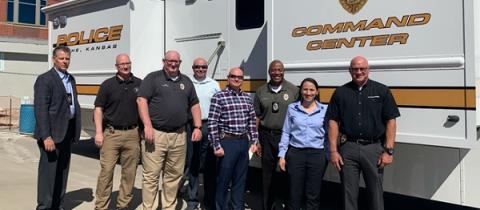
I've secured funds for key local safety projects, including to upgrade Olathe's mobile police command unit with new technology so folks can get immediate onsite assistance.
If you're in an emergency, please always dial 911 to get help right away. In this section, you can find out how to contact your local police to ask questions and other law enforcement throughout the Kansas Third District -- whether local, state, or federal.
Local Police Departments (alphabetical order): If you have questions and aren't in an emergency where you should dial 911, your local police department oftentimes is the best place to ask questions or find help. Here are websites and contacts local law enforcement agencies throughout the Kansas Third District, in alphabetical order.
| Bonner Springs | (913) 422-7800 |
| Edwardsville | (913) 356-6054 |
| Fairway | (913) 262-2364 |
| Gardner | (913) 856-7312 |
| Kansas City, Kansas | (913) 596-3000 |
| Leawood | (913) 642-5555 |
| Lenexa | (913) 477-7300 |
| Louisburg | (913) 837-3191 |
| Merriam | (913) 322-5560 |
| Mission | (913) 676-8300 |
| Olathe | (913) 971-7455 |
| Osawatomie | (913) 755-2101 |
| Ottawa | (785) 242-1700 |
| Overland Park | (913) 895-6000 |
| Paola | (913) 259-3631 |
| Prairie Village | (913) 642-6868 |
| Roeland Park | (913) 782-0720 |
| Shawnee | (913) 631-2155 |
| Shawnee Mission | (913) 993-6452 |
| Spring Hill | (913) 592-2700 |
| Westwood | (913) 362-3737 |
County: Our local county sheriffs also play an important law enforcement role and are as well primarily responsible for ensuring public safety in many smaller communities. You may visit their websites to find more information or call the numbers below to ask questions.
- Anderson: (785) 448-5678
- Franklin: (785) 229-1200
- Johnson County Sheriff
- Dispatcher Non-Emergency: (913) 782-0720
- Administrative and office information: (913) 715-5800
- Johnson County Park Police: (913) 438-7275
- Miami: (913) 294-3232
- Wyandotte: (913) 573-2861
Kansas Law Enforcement: State law enforcement agencies serve critical roles too, including keeping our state highways safe and more. You may visit these websites to learn more or call to ask questions.
- Kansas Bureau of Investigation: (785) 296-8200
- Kansas Highway Patrol: (785) 296-6800
- Kansas Attorney General: (785) 296-2215
Federal Law Enforcement: Lastly the U.S. federal government enforces federal laws, partners with local police, and helps keep our country safe. You can learn more about some key federal agencies below.
- Federal Bureau of Investigation (FBI): This federal agency is responsible for investigating a variety of federal offenses including those related to cybercrime, violations of civil rights, public corruption, and some violent crimes.
- Phone: 1 (800) CALL-FBI
- What the FBI Investigates
- Other contact options / submit a tip
- U.S. Drug Enforcement Agency: This agency helps combat trafficking in illegal substances that threaten our communities. You can visit their website to find resources for your family or call or email for questions.
- (202) 307-1000
- info@dea.gov
- U.S. Postal Inspection Service: The Postal Service has a law enforcement division to respond to mail fraud and theft, protect postal employees, and illegal narcotics.
- 1 (877) 876-2455
- Report a crime
- U.S. Department of Justice: The Justice Department houses a variety of additional federal law enforcement agencies, including the Bureau of Prisons and the U.S. Marshall's service. You can learn more on their website.
Click here to go back to the main menu.
Click here to take my survey to share your priorities.
Law enforcement services: Property checks, fingerprinting, crime maps, and more.
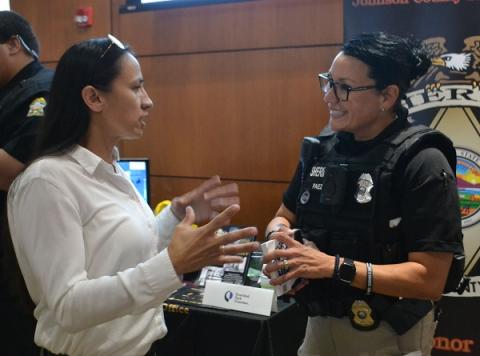
Law enforcement agencies in our region offer a variety of services to help keep local families safe. That may include checking on your property if you're out of town, fingerprinting services, or even free gun locks.
You can learn more about many of these services in this section. If you need a service that isn't listed in your community, contact law enforcement in your area to ask questions.
Criminal history check: The Kansas Bureau of Investigation may be able to assist you with a criminal history check, which are available to the public.
Property watch: Some law enforcement agencies may be able to help keep an eye on your property if you're away from your home for an extended period. The following communities are known to offer property watch services. Click on a link below to learn more:
- Miami County
- Bonner Springs
- Edwardsville
- Fairway
- Leawood
- Lenexa
- Merriam
- Mission
- Prairie Village
- Roeland Park
- Shawnee
- Spring Hill
- Westwood
Alarm registration: Some local communities either encourage or require you to register your security system with the local police so you can receive more reliable help. Available information for the following communities is below:
Crime maps: Some law enforcement agencies publish maps of criminal activity within their jurisdiction. Here are some known local crime maps that are available:
- Johnson County
- Gardner
- Kansas City, Kansas
- Leawood
- Merriam
- Mission
- Olathe
- Ottawa
- Overland Park
- Prairie Village (under crime prevention menu)
- Shawnee
- Spring Hill
Fingerprinting services: Local residents in need of fingerprinting services may be able to receive assistance for free or little cost.
- Johnson County
- Miami County
- Bonner Springs
- Edwardsville
- Fairway
- Gardner
- Kansas City, Kansas
- Leawood
- Lenexa
- Louisburg
- Merriam (under "Other Services" on main page)
- Mission
- Osawatomie
- Ottawa
- Overland Park
- Prairie Village
- Shawnee
- Spring Hill
- Westwood
Hire an off-duty officer: In some jurisdictions, you may be able to hire an off-duty officer for security purposes. Learn in the links below.
Additional Notable Services:
- Cell Phones for Emergency Services: The Overland Park Police Department collects old cell phones and then refurbishes them for people who need phones for emergencies.
- Checking on the vulnerable: Two police departments in our region are known to offer services to regularly check on people who may not have anyone else to check on them.
- Gun locks: Some local police departments offer free gun locks to help prevent harmful accidents. If you own a firearm, please explore the resources that are available to you.
- Security assessments: The police departments of Overland Park and Shawnee may be able to assess your property and steps you may take to better protect it.
- Dispose of household hazardous waste: The City of Olathe operates a year-round program for Johnson County residents to safely dispose of Household Hazardous Waste (HHW) at no charge. Stored chemicals can sometimes cause fires or cause people to get ill, so properly it's important to dispose of these products properly.
Click here to go back to the main menu.
Click here to take my survey to share your priorities.
Fire safety and prevention
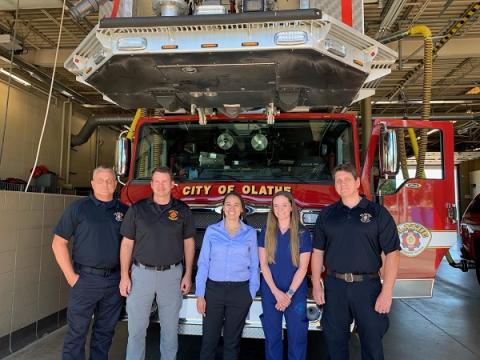
Fire departments throughout our region respond to thousands of calls every year. Yet, many families can take steps to prevent fires and stay safe, including by installing working smoke alarms.
You can find resources and information here to help keep your families safe.
Smoke Alarms: Smoke alarms are a critical safety tool that every household and business should have to stay safe. They can alert you and loved ones to a possible fire, giving everyone precious time. Yet, the state fire marshal reports that a working smoke alarm was not present in 82 percent of Kansas house fires.
- Free Smoke Alarms: The state fire marshal has more information on smoke alarms and how you may be able to get one for free through your local fire department. The alarms may be installed by trained volunteers.
- Installation and maintenance: The Overland Park Fire Department recommends having working smoke alarms on every floor of your building, inside and outside of each sleeping area, and at least three feet away from air vents and exhaust fans. You can find additional information from them below, including an instructional video.
Cooking Safety: According to the U.S. Fire Administration, cooking is far and away the leading cause of home fires and related fire injuries. This makes it all the more important to take commonsense preventive measures to stop fires in your kitchen in the first place.If you have a fire that escapes your oven, leave your house right away and call 911.
Fire extinguishers: A fire extinguisher can be an important tool to put out a fire quickly, but many adults are unfamiliar with how to use them properly. You can refer to the following resources to learn more about fire extinguishers and how to stay safe.
- U.S. Fire Administration: Choosing and Using Fire Extinguishers
- Occupational Safety and Health Administration (OSHA) Portable Fire Extinguishers
- Image
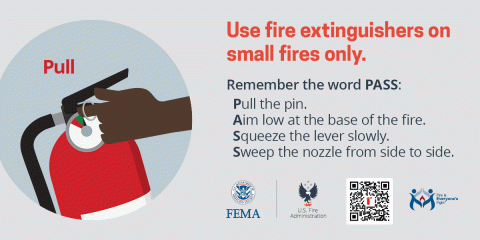
Home Escape Plan: You should have a home escape plan in the event of a fire so you and your family can escape quickly. Your escape plan should be written down, practiced at least twice a year, and include two escape routes out of each room. Please visit the following websites to see how you can make and practice your own home safety plan.
- U.S. Fire Administration: Home Escape Plans
- Ready.gov: Practice your home escape plan
- Overland Park Fire Department Fire Prevention Information
Additional resources: Below you can find additional information to keep you, your family, or small business safe from fires.
- U.S. Fire Administration: Fire Prevention and Community Risk Reduction
- Ready.gov: Home Fires
- National Interagency Fire Center
- Consumer Product Safety Commission: Fire Safety. This website may also help you find products that have been recalled due to fire hazards.
Click here to go back to the main menu.
Click here to take my survey to share your priorities.
Disaster preparedness
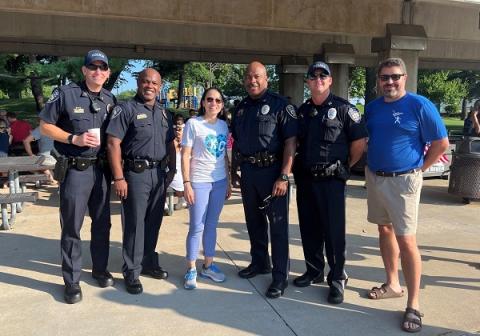
Like everywhere else in our nation, our region unfortunately is prone to some natural disasters. Thankfully, there are commonsense steps that Kansans can take to prepare and stay safe.
Build an Emergency Kit: One of the most important steps any family or business can take is to build an emergency kit. A kit should contain food, water, medical supplies, and other necessities to keep people safe for several days. A kit should also be in an easily accessible location. You can learn more below in the links from the Federal Emergency Management Agency.
Disasters in Kansas: Kansas is more prone to certain types of disasters, including tornadoes and possible flooding. You can learn about how to prepare ahead of time to stay safe and what to do during such a disaster by navigating the links below from ready.gov.
- Emergency Alerts | Johnson County Kansas
- Tornadoes
- Floods
- Extreme heat
- Winter weather
- Power outages
- Additional emergencies
Local resources and alerts: Below you can learn more about safety information in your county. You may be able to subscribe to local emergency alerts in your area, learn how sirens in your community may work in the event of an emergency, and more.
Click here to go back to the main menu.
Click here to take my survey to share your priorities.
Child safety

Local families may be able to access a range of services from federal, state, and local law enforcement agencies to keep their children safe. For example, you may be able to access age-appropriate education programs from law enforcement. Local police may also be able to inspect your child's car safety seat to make sure it's installed correctly.
Educational information:
- Safe Kids Johnson County: The Johnson County Department of Health and the Environment offers resources to help local families keep their children safe while at home, playing, or on the road.
- Miami County Sheriff's Office Safety Town: This program helps educate incoming kindergarteners on a variety of important topics to help them stay safe. That includes everything from properly wearing a seat belt to being mindful of strangers.
- Children affected by crime: The FBI has prepared information for parents and caregivers on how to help care for children who may have been impacted by crime.
- Child Welfare Information Gateway: Administered by the U.S. Department of Health and Human Services, this website helps connect families with a variety of educational resources to keep children safe. That includes information to help kids who may be suffering from domestic violence, abuse, and neglect.
- Children's Bureau: This federal office is dedicated to reducing child abuse and neglect, increasing the number of adoptions, and strengthening foster care.
- U.S. Consumer Product and Safety Commission Page on Child Safety: Families can learn more about how to mitigate common household and play hazards to keep their children safe.
- Child Care Licensing Program Online Facility Compliance Search: Search child care facilities in your region to learn more about possible issues.
Car seat and vehicle safety assistance: Specialized car seats for children are a critical tool to keep kids safe. However, it's important to make sure they are installed correctly. Thankfully, resources are available to help and some law enforcement agencies in our region may be able to help, including through onsite inspections. You may also contact your local law enforcement to learn more about any services they may offer.
- Safecar.gov: Various resources and information on child seats, including tutorials and videos, may be found on this federal safety website.
- Child passenger safety information: Learn more about how to keep your children safe in your vehicle from the Kansas Highway Patrol.
- Child Safety: The National Highway Traffic Safety Administration may have resources to offer as well.
- Child seat inspection and safety services: The following counties and communities are known to offer onsite help too.
Click here to go back to the main menu.
Click here to take my survey to share your priorities.
Consumer protection
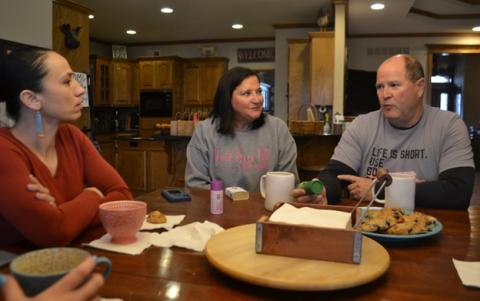
Unfortunately, con artists and unscrupulous scammers are on the lookout to take advantage of Kansans. The following resources may help protect you against fraud, identity theft, and much more.
Consumers and families:
- Identitytheft.gov: One of the most common forms of fraud these days in our information age is identity theft. If this is impacting you or someone you know, this federal website may be able to help you.
- Consumer Financial Protection Bureau: This federal agency is dedicated to protecting consumers and ensuring hardworking folks are treated fairly in their financial transactions. On their website you can learn more about how to avoid common types of scams and your options to responding to fraudulent activities.
- Federal Trade Commission (FTC): The FTC's Bureau of Consumer Protection is here to protect from people unfair and fraudulent practices, including spam robocalls and more.
- Stopfakes.gov: Learn more about how to avoid counterfeit and pirated goods of lesser quality.
Investment fraud:
- Investor.gov: The Security and Exchange Commission's (SEC) Office of Investor Education and Advocacy can help you independently research a person or firm who may be offering you an investment and may help you answer other questions. You can call them at 1 (800) 732-0330 to learn more.
- Investment Advisor Public Disclosure: The SEC also manages a website where people can look up different investment advisors to learn more about their history, qualifications, background, and other critical information.
Protecting seniors:
- Preventing elder fraud: The U.S. Department of Justice maintains a website to help protect seniors against elder fraud. You can also call their elder fraud hotline at 833-FRAUD-11 or 833-372-8311.
- Medicare fraud: The Centers for Medicare and Medicaid Services, or CMS for short, reports that Medicare fraud can lead to higher health care costs and taxes. Being aware and careful can help protect everyone. You can also report suspected cases of fraud by calling 1-800-MEDICARE (1-800-633-4227).
Click here to go back to the main menu.
Click here to take my survey to share your priorities.
Substance abuse help and recovery resources
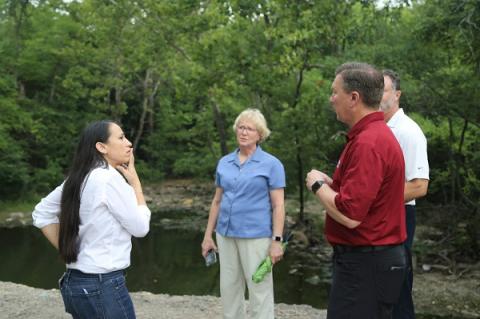
According to the U.S. Centers for Disease Control and Prevention (CDC), one in every seven Americans reports experiencing a substance abuse disorder. Substance abuse -- everything from alcohol to the fentanyl crisis -- takes a serious toll on our families and communities.
If you or someone you know needs help, please know that resources and caring people are available to assist you.
- Substance Abuse and Mental Health Services Administration National Helpline: This helpline is available 24 hours a day, seven days a week for people who may be suffering from mental health and substance abuse challenges. It is operated by the Substance Abuse and Mental Health Services Administration, which I've been glad to help fund in the House.
- Call: 1 (800) 662-HELP (4357)
- Call: 1 (800) 662-HELP (4357)
- Findtreatment.gov: This is a confidential and anonymous federal resource so people can get connected with the assistance they need.
- Drug Enforcement Agency Recovery Resources: Includes step by step guides on finding treatment, assistance with opioids, and information on treatment resources like naloxone that can help rapidly reverse an opioid overdose.
- Reducing stigma: No one should be ashamed for seeking help when they need it. The CDC has resources to connect people with recovery and how we can all work towards breaking the stigma regarding substance abuse.
- Additional substance abuse help: Usa.gov has a clearinghouse of additional information on this issue, including a directory that can help people find local support groups such as Alcoholics Anonymous.
- Safe prescription drug disposal: It's not uncommon for friends or family members to stumble onto unused or expired prescriptions in medicine cabinets, which tragically can lead to addiction. Thankfully, there are safe ways to dispose of these medicines, so they won't pollute our water ways or inadvertently harm others. Drop off sites are at many local police departments and pharmacies across our region. You may be able to find locations near you at the Food and Drug Administration's website.
Click here to go back to the main menu.
Click here to take my survey to share your priorities.
Mental health

Mental health is health. I know these can be stressful times, so please know that there are resources available to you and your loved ones.
- Incidents of Mass Violence: The SAMHSA Disaster Distress Helpline supports survivors, family members, responders, and recovery workers who are affected by incidents of mass violence and other disasters. Information on this web page includes a list of signs of emotional distress related to incidents of mass violence, populations that may be at risk for emotional distress after mass violence, and additional resources for coping.
- Tips for Young Adults Coping With Mass Violence: In this tip sheet, the SAMHSA Disaster Technical Assistance Center discusses ages 18 to 26 as a phase of development and explains how incidents of mass violence may affect people within this phase. The tip sheet highlights common reactions to mass violence, tips for coping, and resources for disaster behavioral health support.
- Tips for Young Adults Coping With Mass Violence: In this tip sheet, the SAMHSA Disaster Technical Assistance Center discusses ages 18 to 26 as a phase of development and explains how incidents of mass violence may affect people within this phase. The tip sheet highlights common reactions to mass violence, tips for coping, and resources for disaster behavioral health support.
- 988: Just dial or text 988 on your phone to reach the Suicide and Crisis Lifeline. Anyone who reaches out is connected with trained counselors that are here to help you. I was glad to vote for the law that helped establish this new resource.
- Call or text: 988
- Call or text: 988
- Local mental health resources: A variety of mental health resources are available throughout the Kansas Third District. Please explore your options and other resources that are available in your county using the links below, courtesy of the KanCare Ombudsman office (PDF).
- FindTreatement.gov: Residents of the Kansas Third District may also be able to find additional mental health treatment options through the federal website findtreatment.gov. You can enter your address to find options that may be near you.
- Substance Abuse and Mental Health Services Administration National Helpline: Another helpline that's available 24 hours a day, seven days a week for people who may be suffering from mental health and substance abuse challenges. It is operated by the Substance Abuse and Mental Health Services Administration, which I've been glad to help fund in the House.
- Call: 1 (800) 662-HELP (4357)
- Call: 1 (800) 662-HELP (4357)
- National Maternal Health Hotline: Are you pregnant or did you just have a baby and need help? The National Maternal Health Hotline is confidential and available 24 hours a day to help.
- Call: 1-833-TLC-MAMA (or 1-833-852-6262))
- Call: 1-833-TLC-MAMA (or 1-833-852-6262))
- Veterans Crisis Line: I understand many veterans are struggling with hidden psychological wounds, especially after thousands served in Iraq and Afghanistan. If you need assistance, resources and caring people are available to help you. The Veterans Crisis line has now been integrated with the new national 988 help line.
- Call: 988, then press 1
- Call: 988, then press 1
- Disaster distress hotline: If you or a loved one has been impacted by a disaster or another tragedy, it can stir strong emotions and grief. You may be able to call this phone number to find relevant assistance.
- Call: 1 (800) 985-5990
- Call: 1 (800) 985-5990
- MentalHealth.gov: If you'd like to learn more about mental health conditions that may be impacting you or a loved one, the Substance Abuse and Mental Health Services Administration operates this federal website to connect folks with information.
Click here to go back to the main menu.
Click here to take my survey to share your priorities.
Help for survivors of domestic violence and sexual assault
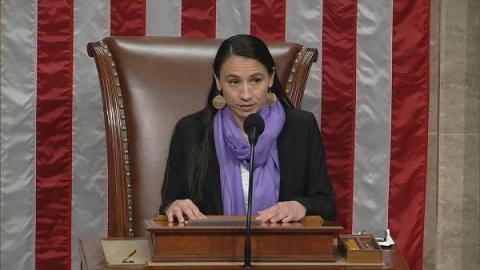
One of my first acts as your representative was to preside over the House floor as my colleagues and I voted to reauthorize the Violence Against Women Act. I was proud to later help pass the bipartisan law that reauthorized this legislation to ensure law enforcement has more tools to stop abusers and to connect survivors with support services.
If you or someone you know needs assistance, please know that people who care are available to assist. Below are resources that are available to folks throughout the Kansas Third District.
- National Domestic Violence Hotline: The Violence Against Women Act established the National Domestic Violence Hotline to connect people in need with help. If you're concerned about your internet activity being monitored, the Hotline recommends calling for assistance.
- Call: 1 (800) 799-SAFE (7233)
- Call: 1 (800) 799-SAFE (7233)
- Local resources: Here are additional resources that are available to Kansas Third District residents by county. Each county may be able to connect folks with shelters, counseling services, and other possible help from law enforcement.
- Kansas Legal Services: Some Kansans with more modest incomes may also qualify for free or low-cost legal services. To learn more, visit their website or call (785) 233-2068, or reach them toll free at 1 (800) 723-6953.
Click here to go back to the main menu.
Click here to take my survey to share your priorities.
Online safety
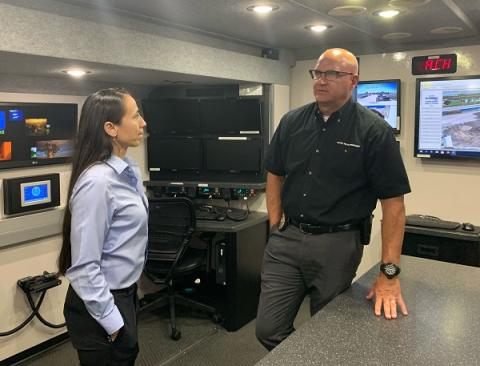
These days, we must be mindful of being safe both at home and online. Online scammers are always looking for new ways to compromise our devices. And unfortunately, young people face many challenges on social media platforms and elsewhere. Please feel free to explore these resources to stay safe.
Online security: It's important to take online risks seriously. Scammers may try to compromise critical passwords to steal from you or install software that may disable your devices.
- Federal Trade Commission - Online Privacy and Security: This website is a clearinghouse of useful online security information. Learn more about how to make strong passwords, recognize malware, secure home security cameras, and much more.
- 4 Things to Stay Cyber Safe: The U.S. Cybersecurity and Infrastructure Security Agency (CISA) is a part of the Department of Homeland Security and is focused on cyber threats. The agency recommends four basic steps that everyone can take to protect themselves online. That includes updating your software and using strong passwords. You can learn more on their website, including through instructional videos.
- CISA Shields Up Campaign: CISA also has a variety of additional information for families, businesses, and more to protect themselves online.
Youth and family resources: Unfortunately, while social media platforms and online activities may have some benefits, they may also present particular risks -- especially on the mental health of our youth. The following resources may help your family.
- U.S. Surgeon General's Advisory -- Social Media and Youth Mental Health: The U.S. Surgeon General has issued a new report detailing the possible impacts of social media on youth. On page 17, you can find the Surgeon General's recommendations that young people, parents, and caregivers may take to protect themselves.
- Cyberbullying: Unfortunately, many children these days often face bullying online. You may visit stopbullying.gov to learn on how to keep your children safe online.
- FBI -- Stay Safe Online: The FBI has a website dedicated to teaching young people and families on how to stay safe and be responsible online. You can find resources that are age appropriate by grade level.
- Federal Trade Commission -- Protecting Kids Online: This website is a clearinghouse of resources to keep children and families safe online. You can learn more about kids and mobile phones, texting, parental controls, and more.
- Preventing human trafficking: Learn more from the U.S. Department of Homeland Security on how to stay safe and prevent human trafficking.
Click here to go back to the main menu.
Click here to take my survey to share your priorities.
If the survey does not display properly on mobile, please click here to take it on a different page.
